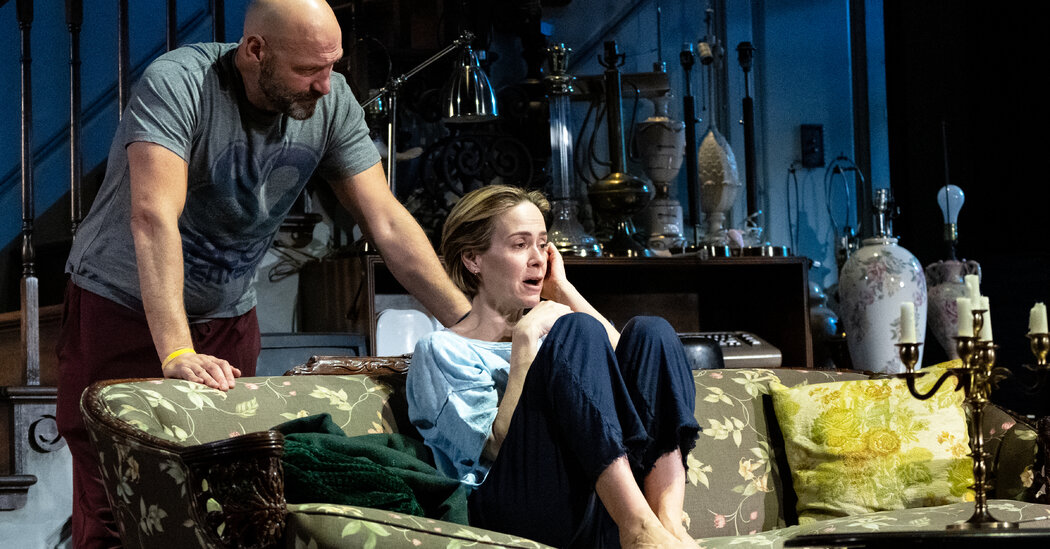This production, which concluded its run at the Helen Hayes Theater on March 3, has transferred to the Belasco Theater, where it is scheduled to run through June 23. The cast is unchanged except that Ella Beatty has replaced Elle Fanning in the role of River.
Think of the worst person you know: the kind who blabs people’s secrets, mocks their diction, dismisses their pain while making festivals of her own. Throw in a tendency toward casual antisemitic slurs, for which she thinks she has a free pass, and a “What’s the big deal?” approach to racism.
Now add a deep wound and a wicked tongue and you’re almost partway to Antoinette Lafayette, the monster played by Sarah Paulson in the blistering revival of “Appropriate” that opened on Broadway on Monday. Recalling yet somehow outstripping the thrilling vileness of theatrical viragos like Martha in “Who’s Afraid of Virginia Woolf?” and Violet in “August: Osage County,” she is the burned-out core of a nuclear family reactor, taking no prisoners and taking no blame.
But even in Paulson’s eye-opening, sinus-clearing performance, Toni, as she’s called, doesn’t sum up the outrageousness of Branden Jacobs-Jenkins’s play, which has a deep wound and wicked tongue of its own. To get all the way to its sweet spot — and Lila Neugebauer’s production for Second Stage definitely gets there — you must further multiply Toni by her brothers, each awful in his own way.
Bo (Corey Stoll) is passive and entitled, content to let others fail as long as he can’t be faulted. Frank (Michael Esper) is a serial screw-up, the rare person for whom statutory rape is not the worst thing on his résumé. At the heart of their grievances is greed — Bo’s for money, Frank’s for forgiveness and Toni’s for revenge.
So when the three, accompanied by their assorted spouses, children, enablers and ghosts, gather in the grand dramatic tradition to dispose of their late father’s estate, you know things are going to explode. Indeed, as the curtain rises at the Helen Hayes Theater, it appears they already have. The Arkansas plantation house in which generations of the family have lived, in eyeshot of the cemetery where generations of their slaves are buried, is now a hellhole in spirit and fact. The once grand building is collapsing under the weight of centuries of evil and, more recently, decades of hoarding.
The two seemingly incompatible stories — the evil and the hoarding, one national, one domestic — come together in a way I don’t want to spoil; it’s part of the brilliance of the play that it lands its biggest surprises with satisfying thumps at exactly the right moments. Suffice to say that when horrible relics of the past, both the country’s and the family’s, are discovered in the clutter, they force the Lafayettes to re-examine the legacy of their father, supposedly once in line to be a Supreme Court justice but also, depending on whom you ask, a saint or a psychopath.
To Toni he was “a thinker! A loving person!” Frank says he was bipolar and abusive. Bo is too avoidant to offer a strong opinion, but his wife, Rachael (Natalie Gold), makes up for that. To her there is no question the old man was an antisemite (she once overheard him refer to her as Bo’s “Jew wife”) and a racist. Even so, she has insisted on bringing the couple’s children — a petulant 13-year-old girl (Alyssa Emily Marvin) and a hyperactive 8-year-old boy (Lincoln Cohen, on the night I saw it, and, alternating in the role, Everett Sobers) — to experience their “roots” as part of “a little American history Southern tour-type thing.”
It’s the kind of laugh line — there are also guffaws, cackles and strange gasp-giggle combos — that works because we think we know more than she does. But it’s also a stinger because, the play suggests, we may not. In “Appropriate,” the “little American history Southern tour-type thing” is meant for the audience, too.
That history is of course full of horrors, not the golden past portrayed in works about the gracious days of juleps and spirituals. But neither is it, for Jacobs-Jenkins, as neatly political and singularly damning as when filtered through a progressive lens. Questioning whether racism and antisemitism are really the core sins of this particular family, “Appropriate” posits that the problem may instead be that they’re just personally hideous. And if that’s true, could it also be true that the various institutions of subjugation so rampant throughout human society are nothing more (or less) than convenient formats for the expression of hate hard-wired in our hearts?
Cherry-picking some of the worst examples imaginable — the play also features Elle Fanning as Frank’s sententious, sage-smudging fiancée and Graham Campbell as Toni’s drug-dealing son — Jacobs-Jenkins makes a convincing if despairing case. That he does so largely through comedy and melodrama (with an astonishing coda of surrealism) makes “Appropriate” easier to enjoy than to understand. The grammatically two-faced title doesn’t help, but easy understanding is not what the author appears to be after.
I have to admit that when I first saw it, at the Signature Theater in 2014, neither understanding nor enjoyment were forthcoming. Rereading my scathing review in light of what is obviously a rave today, I am forced to grapple with my own past, and the play’s. It would be easy to say that the difference between then and now is the heavy rewriting Jacobs-Jenkins has done in the interim. And certainly, comparing the two scripts, I see the clearer dramatic architecture and sharper point-of-view that a playwright in his prime, at 38, can impose. (I thought Jacobs-Jenkins’s most recent play, “The Comeuppance,” was one of the best of 2023.)
It would also be easy to attribute the improvement to Neugebauer’s direction, which is so smart and swift for most of the play’s substantial length that you feel gripped by storytelling without being strangled by argument. Her staging, on a towering double-decker set by the design collective dots, is also nearly ideal, accentuating (with the help of Jane Cox’s painterly lighting) the conflicts and alliances among the characters. And the daredevil cast, instead of reveling in falling apart, focuses for as long as possible on keeping it together. We thus experience, in the force of that repression, just how awful human awfulness must be if human will cannot ultimately corral it.
Though all those improvements are real, they do not fully explain why I’ve flipped for this revival. Perhaps this does: Playwrights who show us things we are reluctant to see may have to teach us, over time, how to see it. And we must be willing to have our eyes opened. I guess I’ve changed at least that much in 10 years of reviewing, and Jacobs-Jenkins is part of the reason.
Appropriate
Through March 3 at the Helen Hayes Theater, Manhattan; 2st.com. Running time: 2 hours 40 minutes.

